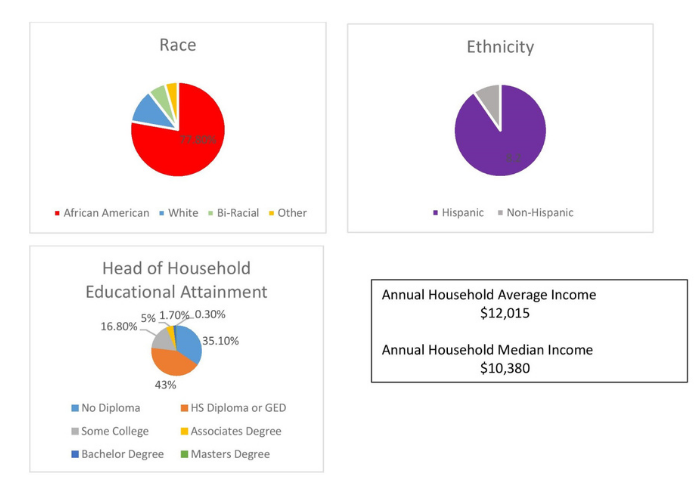In our inaugural post, we utilize our Senior Vice President Donovan Duncan’s story to showcase how we intend to share and connect the stories of our families with data and policies that ensure children and families are stable and thriving.
His math lesson in “less than” didn’t come from a well-worn book.
It came from an early understanding of the mental models people hold about people like him; people on food stamps, people living in public housing, people accessing public benefits in any way. Its why, growing up, he felt the need to keep those things a secret. Even from his closest of friends.
Looking at Donovan Duncan today, you would never be able to guess the challenges he faced in his childhood. He is a graduate of the University of Akron with a bachelor’s degree in Business Administration and Finance and The Cleveland State University with a masters in Organization Development. As the Senior Vice President at Urban Strategies, Inc. he has a range of leadership responsibilities. Among those is oversight of program operations in the 29 distressed communities where Urban Strategies does its work. Communities just like the one where he grew up. In fact, when I asked him, he offered very directly, “I am no different than the families we serve every single day.”
His mother gave birth to him at the age of 18. He is her second child. Though he is the second in birth order, he was the only one of her 4 children who never lived with her. His first exposure to fractions. Instead, he lived his entire childhood with his maternal grandmother. Unlike Donovan, his grandmother never had the luxury of graduating from high school so it was something that she demanded of him. At the tender age of 11, she couldn’t spare the time. She had to get on with the business her parent’s early death prevented them from completing; raising herself and her siblings. This is why his grandmother stressed to him, the importance of graduating from high school. Though she worked hard all her life, the jobs that she could get with less than a high school education, meant the home that she could afford for the two of them was one in public housing.
Thankfully, his grandmother also intuitively understood that all educational opportunities are not created equal. She knew that in order for him to thrive, she had to find a quality educational setting that wouldn’t water down his ambition. For that reason, she enrolled him in a Catholic school outside the neighborhood. She may never have known how truly on the mark she was with that decision. “Only 60% of children who attend urban schools graduate. Only 40% of those who graduate read at a 4th grade level.” (1)
She wanted him to understand that a good quality education and a high school diploma were the path to the “greater than” that he deserved.
The rise in incarceration that has come to be known as mass imprisonment began in 1973. (2) Donovan’s father was part of the growing number of African American men who spend some part of their lives under correctional control. Despite being approximately 14% of the American population, African American’s are 34% of the total 6.8 million correctional population. (3) His father was incarcerated before he was ever born and remained incarcerated for the majority of his life. With such startling statistics, you don’t have to be a math major to figure out early how heavily the odds are stacked against you.
Donovan could have easily embraced those odds and let them defeat him. Instead, his grandmother had a different plan. She instilled in him a strong work ethic and an impenetrable narrative. She reminded him regularly that he is not special despite the adversity he faced, he is special because of it. There is so much to be said for the power of one. One person with hope and vision can absolutely change the world. Though, his grandmother was not the only positive influence he had in his corner. In fact, he learned the importance of multiplication as he experienced the love she had for him multiplied by the love of a strong, supportive group of people who would see him through college.
 Donovan got his first job at the age of 8 years old bagging groceries at the corner market. True to form, by the age of 10 he was working the cash register. Not only did he find work at that corner market, more importantly, he found a village of adults willing to hold him steady. So steady in fact, that by the age of 14, he received an internship at the Cuyahoga Metro Housing Authority (CMHA). He continued at that internship through college and later went on to be employed there as the Director of Development and Operations. He credits both the people and the opportunities available to him for his success. He also found at the housing authority more people to add to his support system.
Donovan got his first job at the age of 8 years old bagging groceries at the corner market. True to form, by the age of 10 he was working the cash register. Not only did he find work at that corner market, more importantly, he found a village of adults willing to hold him steady. So steady in fact, that by the age of 14, he received an internship at the Cuyahoga Metro Housing Authority (CMHA). He continued at that internship through college and later went on to be employed there as the Director of Development and Operations. He credits both the people and the opportunities available to him for his success. He also found at the housing authority more people to add to his support system.
“It was a village of individuals, rooting for me to be successful,” he recalls. “They bought me books. They took me to school when I had no other way. They were some of my biggest influences…the people that started me believing I could be successful. ”
On his left forearm is a tattoo of a quote that his grandmother repeated to him over and over again growing up: “When you walk with purpose, you collide with destiny.” He holds the belief that it is his purpose to open the same opportunities for others that were afforded to him. It is no coincidence that part of his destiny includes providing results based leadership at Urban Strategies, Inc. As was destined, our mission closely aligns with his stated purpose.
These days he can be found rattling off numbers from six different line items in a budget and totaling them in his head before others can even get them on paper. It’s no wonder Donovan Duncan is great at math; in many ways, his life depended on it. Counter to the widely held belief, bootstraps are not the answer to the problems plaguing our children today. His life is proof that when you start with a strong narrative, add in support, multiply with opportunity, and add in a good solid education, the sum of that equation creates infinite possibility.
My optimistic side basks in the glow of what the world might look like if we provided children across all communities with this same kind of opportunity and support. The pessimist, on the other hand, can’t help but wonder why we haven’t done this already. But the realist in me, as painful as it is, well she already knows the answer.
Demographics of Families involved in Case Management with Urban Strategies, Inc.

About the Author: Kristie G. Stutler is a Regional Director for Urban Strategies, Inc. She has a Masters of Science in Social Work, 16 years of experience working with system involved youth, and 3 years of experience working in juvenile justice reform. She is a Class 10 Fellow in the Annie E. Casey Children and Families Fellowship, a trainer, a writer, and a lover of all things that rhyme…
References
- Hernandez, Donald J. (2011) Double Jeopardy: How third grade reading skills and poverty influence high school graduation via aecf.org/m/resoursedoc/AECF-DoubleJeopardy-2012-Full.pdf
- http://www.sentencingproject.org/publications/color-of-justi
ce-racial-and-ethnic-disparity-in-state-prisons/ - naacp.org/criminal-justice-fact-sheet/
